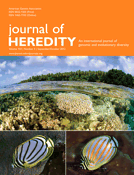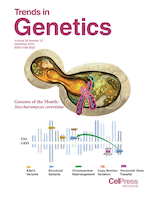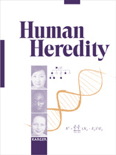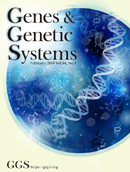
JOURNAL OF HEREDITY
Scope & Guideline
Connecting Disciplines Through Genetic Insights
Introduction
Aims and Scopes
- Genomic and Genetic Diversity Studies:
The journal emphasizes research that explores the genomic underpinnings of genetic diversity, which includes studies on population genetics, phylogenetics, and the evolutionary significance of genetic variation across species. - Conservation Genetics:
Research focusing on the genetic aspects of conservation, including the genetic management of endangered species, the impact of habitat fragmentation on genetic diversity, and the application of genomic tools in conservation efforts. - Evolutionary Genomics:
The journal publishes articles that investigate evolutionary processes through genomic data, including studies on adaptation, speciation, and the evolutionary history of organisms. - Environmental and Ecological Genetics:
Research addressing the interactions between genetic variation and environmental factors, including the genetic basis of adaptations to specific ecological niches and the effects of climate change on genetic diversity. - Methodological Advances in Genetics:
The journal is open to papers that introduce new methodologies or improve existing techniques for genetic analysis, including genome assembly, sequencing technologies, and analytical approaches in genetic research.
Trending and Emerging
- Genomic Resources for Conservation:
An increasing number of publications focus on creating genomic resources for conservation efforts, highlighting the importance of genetic data in managing endangered species and understanding biodiversity. - Integrative Genomics and Multi-Omics Approaches:
There is a rising trend in studies that employ integrative approaches, combining genomics with transcriptomics, proteomics, and metabolomics to provide a more comprehensive understanding of biological processes. - Impact of Climate Change on Genetic Variation:
Research addressing how climate change affects genetic diversity and evolutionary processes is gaining traction, reflecting the urgent need to understand the genetic basis of adaptability in changing environments. - Microbiome and Host Genomics:
Emerging studies are increasingly focusing on the interactions between host genetics and microbiome composition, exploring how these relationships impact health, behavior, and ecology. - Technological Advances in Sequencing and Data Analysis:
The journal is witnessing a surge in publications that leverage cutting-edge sequencing technologies and sophisticated data analysis methods, enabling more detailed and expansive genetic investigations.
Declining or Waning
- Behavioral Genetics:
Research exploring the genetic basis of behavior has diminished, possibly due to a shift towards more molecular and genomic studies that focus on broader ecological and evolutionary contexts. - Traditional Mendelian Genetics:
There has been a noticeable reduction in studies solely focused on classical Mendelian inheritance patterns, as the field has increasingly embraced complex interactions involving genomics and environmental factors. - Genetic Mapping in Agricultural Species:
Papers dedicated to genetic mapping in agricultural species have decreased, reflecting a broader trend towards applying genomic insights to conservation and wild species rather than focusing heavily on domesticated organisms.
Similar Journals

PLoS Genetics
Empowering researchers through open access to genetic innovation.PLoS Genetics, published by the PUBLIC LIBRARY SCIENCE, is a leading open-access journal dedicated to advancing the field of genetics, molecular biology, and related disciplines. With its ISSN of 1553-7404, this esteemed journal has been offering unrestricted access to its content since 2005, fostering a global community of researchers, professionals, and students. Situated in the United States, its contributions can be found at 1160 Battery Street, Ste 100, San Francisco, CA 94111. As of 2023, PLoS Genetics proudly holds a Q1 ranking in multiple categories including Cancer Research, Ecology, Evolution, Behavior and Systematics, Genetics, and Molecular Biology, underscoring its impact in these vital scientific areas. The journal's commitment to disseminating high-quality research is reflected in its impressive Scopus rankings, with notable positions in various fields of study, ensuring that it remains a crucial resource for cutting-edge research and innovation. By providing an open-access platform, PLoS Genetics not only enhances the visibility of genetic research but also encourages collaborations and the sharing of knowledge that can lead to significant breakthroughs in science.

TRENDS IN GENETICS
Elevating the Standards of Genetic ScholarshipTRENDS IN GENETICS, published by CELL PRESS, is a leading journal in the field of genetics, recognized for its significant impact on research and advancements in the discipline. With an impressive Scopus ranking of #10 out of 347 in the category of Genetics and a 97th percentile ranking, this journal stands as a premier platform for publishing innovative, high-quality articles that shape the future of genetic research. Since its inception in 1985, TRENDS IN GENETICS has been at the forefront of the genetic sciences, continuously disseminating crucial findings while maintaining a strong commitment to scientific rigor and integrity. Although it does not currently offer open access options, its rigorous peer-review process ensures that only the most relevant and groundbreaking studies make it to publication. Scholars and practitioners in genetics will find this journal to be an invaluable resource for keeping abreast of the latest developments, trends, and methodologies that drive the field forward.

Evolutionary Biology
Advancing Knowledge in Evolutionary SciencesEvolutionary Biology is a distinguished academic journal published by Springer, focusing on the intricate fields of ecology, evolution, behavior, and systematics. This journal, with the ISSN 0071-3260 and E-ISSN 1934-2845, has established itself as a critical platform for cutting-edge research and innovative ideas that shape our understanding of biological evolution and its implications. Operating from Germany, it ranks in the Q2 quartile in its category for 2023, placing it in the top tier of journals recognized for quality and impact, with a Scopus rank in the 66th percentile among its peers. Despite not being Open Access, this journal ensures comprehensive dissemination of knowledge essential for researchers, professionals, and students passionate about evolutionary studies. With a publication history tracing back to 1993 and converging years up to 2024, Evolutionary Biology continues to significantly impact the academic landscape, fostering dialogue and collaboration across various disciplines within the biological sciences.

RUSSIAN JOURNAL OF GENETICS
Fostering Collaboration in the Genetic CommunityRUSSIAN JOURNAL OF GENETICS is a significant platform in the field of genetics, published by PLEIADES PUBLISHING INC since its inception in 1996. With an ISSN of 1022-7954 and an E-ISSN of 1608-3369, the journal focuses on a wide array of topics within genetics, providing researchers, professionals, and students with insights into advancements and discoveries in this ever-evolving discipline. While it currently holds a Q4 ranking in the 2023 Genetics category according to Scopus, representing invaluable opportunities for knowledge dissemination, the journal is actively working to enhance its impact in future rankings. Readers will find the journal a repository of diverse genetic research findings, methodologies, and theoretical advancements. Although it is not an open-access journal, it is committed to serving the academic community through rigorous peer-reviewed articles. With a consistent publication trajectory spanning to 2024, the RUSSIAN JOURNAL OF GENETICS remains a crucial resource for those aspiring to stay at the forefront of genetic research and applications.

CONSERVATION GENETICS
Advancing the Science of Biodiversity PreservationCONSERVATION GENETICS is a leading journal dedicated to the study of genetic diversity and its implications for conservation biology. Published by SPRINGER in the Netherlands, it serves as a vital resource for researchers, professionals, and students interested in the intersection of genetics and environmental stewardship. With an ISSN of 1566-0621 and a focus on articles published since 1994, this journal currently holds impressive rankings, including Q2 in Ecology, Evolution, Behavior, and Systematics and Q3 in Genetics as of 2023, making it a pivotal platform in these fields. Although not an Open Access journal, it provides substantial insights into conservation strategies and genetic research, facilitating the understanding of species preservation and biodiversity. By contributing to the discourse surrounding genetic factors in conservation, CONSERVATION GENETICS underscores the importance of integrating genetic knowledge for effective management of natural resources and ecosystem sustainability. Join a community of scholars committed to advancing the science of conservation genetics through innovative research and collaborative inquiry.

HUMAN HEREDITY
Charting the Course of Human Genetic ResearchHUMAN HEREDITY is a peer-reviewed journal published by KARGER, dedicated to advancing the understanding of genetics and inherited traits in human populations. Established in 1950, this journal has become a vital resource for researchers, professionals, and students in the fields of genetics and clinical genetics, currently categorized in the third quartile (Q3) for both general and clinical genetics as of 2023. With an ISSN of 0001-5652, HUMAN HEREDITY provides rigorous academic content that analyzes heredity patterns and genetic variations, aiming to illuminate the complexities of human genetic inheritance. Although it does not operate on an open access model, the journal offers a comprehensive collection of studies and insights that are crucial for genetic research and clinical applications. Situated in Basel, Switzerland, HUMAN HEREDITY contributes to the global dialogue in genetics, making it an essential platform for those seeking to enrich their understanding of human heredity in a rapidly evolving scientific landscape.

BMC Ecology and Evolution
Exploring the intricate dance of ecology and evolution.BMC Ecology and Evolution is a premier open access journal published by BMC, dedicated to advancing our understanding of ecological and evolutionary processes in a rapidly changing world. With a growing e-ISSN of 2730-7182, this journal serves as a vital platform for researchers and scholars looking to disseminate high-quality research findings that explore the interplay between ecological dynamics and evolutionary developments. Operating from London, England, BMC Ecology and Evolution provides seamless access to valuable research, ensuring that significant studies are available to a global audience without barriers. The journal fosters a collaborative atmosphere, welcoming diverse research methodologies and interdisciplinary approaches, thus making it a crucial resource for professionals, students, and academics alike. Its commitment to open access ensures that pioneering research in ecology and evolution is readily available, encouraging the continuous exchange of ideas and knowledge in the field.

SILVAE GENETICA
Enhancing forest management through genetic insights.SILVAE GENETICA is a dedicated academic journal in the field of forestry and genetics, published by SCIENDO. Based in Germany, this journal has been a key platform for advancing knowledge in tree genetics and management since its inception. The journal has demonstrated its commitment to quality research with its categorization in the Q3 quartile for Forestry and Q4 for Genetics as of 2023, indicating its relevance and contribution to the respective fields. With an ISSN of 0037-5349 and an E-ISSN of 2509-8934, SILVAE GENETICA covers a diverse range of topics related to the genetic analysis and improvement of forests, employing innovative techniques beneficial for both researchers and practitioners. The journal is indexed within Scopus, ranking #76 in its category for Agricultural and Biological Sciences and #281 for Genetics. While it does not offer Open Access, the importance of the journal's contributions to forestry science and genetic studies cannot be overstated, making it an essential resource for researchers, professionals, and students alike.

GENETICA
Pioneering Insights in Animal, Plant, and Insect GeneticsGENETICA is a prominent journal published by SPRINGER, dedicated to advancing the field of genetics and its applications across various biological disciplines, including animal science, plant science, and insect science. Since its inception in 1919, the journal has consistently served as a vital platform for researchers and professionals to disseminate high-quality research findings that explore the genetic bases of biological phenomena. With its current scope spanning from 1943 to 2024, GENETICA holds a commendable position in the academic community, as evidenced by its Q2 ranking in both animal science and insect science, and its active contribution to interdisciplinary studies in genetics. Although the journal does not offer open access, it remains accessible through institutional subscriptions and libraries, ensuring its vital research is widely circulated. Researchers, professionals, and students alike will find GENETICA an invaluable resource for the latest discoveries and methodologies in the ever-evolving landscape of genetics.

GENES & GENETIC SYSTEMS
Advancing the Frontiers of Genetic ResearchGENES & GENETIC SYSTEMS, an esteemed journal published by the Genetics Society of Japan, serves as a vital platform for the dissemination of innovative research within the fields of genetics, molecular biology, and medicine. Established in 1996 and based in Mishima, Shizuoka, Japan, this journal has actively contributed to the academic community, fostering collaboration and knowledge sharing among researchers and professionals. The journal’s impact can be seen through its category quartiles, which reflect its position in Genetics, Molecular Biology, and Medicine, and while it currently ranks in Q4 in Genetics and Q3 in Medicine (miscellaneous), it is poised for growth as it continues to publish pivotal studies. With a commitment to open access, GENES & GENETIC SYSTEMS ensures that research findings are freely accessible to the global scientific community, promoting a more inclusive approach to knowledge distribution. This journal is essential for students, researchers, and professionals seeking to stay informed of advancements in genetic research and its implications for the broader field of medicine.